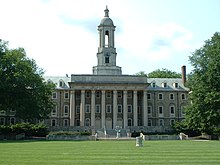| Left to right: Rich Pancost, Sir John Beddington, Paul Bates |
I became the second Director of the Cabot Institute on the 28th of July, taking over from Paul Bates and planning to continue making Cabot one of the world’s premier environmental institutes. The past month has been rather exhilarating in terms of the breadth and quality of my interactions. My experiences have cemented my reasons for assuming this role – the Cabot Institute represents hundreds of brilliant people, working together and working with equally brilliant government, NGO and industry partners to better understand our environment, our relationship to it and the challenges of our co-dependent future. The central aspect of my job as Director is to continue to support those individuals and especially those collaborations.
My first month also confirmed that we have vital, illuminating and challenging ideas to share and we will all benefit from improved communications. Hence, this blog post and the many to follow it. There are many buried treasures, both clever insights and mature wisdom, on the Cabot Blog, and I encourage new visitors to explore those past posts. For example, see recent posts on Food Security by Boo Lewis and Energy Markets by Neeraj Oak. As for me, I’ll be bringing in a combination of personal observations and insights arising from discussions with Cabot partners, as well as ideas emerging in my own discipline.
 |
| Penn State University |
As a bit of an introduction, I grew up in on a dairy farm in Ohio, and attended Case Western Reserve University, where I dithered back and forth between majors in political science and astrophysics before realising my heart was in Geology…. life decisions are complicated for all of us. I obtained my PhD from Penn State University , using geochemical tools to study past climates, and then continued that work as a post-doctoral researcher at the Royal Netherlands Institute for Sea Research. And in 2000 I joined the Organic Geochemistry Unit in the School of Chemistry here at Bristol. Along the way, I played a fair bit of Ultimate (Frisbee ).
I examine organic compounds in a wide range of materials, from soils and plants to microbial mats to ancient rocks. Those organic compounds can be exceptionally well preserved for long periods of time, allowing us to investigate aspects of how the Earth’s biological and chemical systems interact on time scales from tens to millions of years. The topics of my research range from understanding the formation and fate of methane to reconstructing the climate history of the planet (especially during times when carbon dioxide levels and temperatures were higher than those of today). It requires working with a diverse group of people, including climate modellers, mathematicians, social scientists and petroleum geologists. Those themes will become more prominent in this blog over the coming months, especially as I report back from a few conferences and around the release in late September of the Fifth Report from IPCC Working Group 1: The Physical Basis of Climate Change. But I will also be discussing Environmental Uncertainty and Decision Making: what it means, my personal perspectives on it, and why it is at the heart of the Cabot Institute’s mission.
Finally, this is meant to be an interactive forum. Do use the comments section and do suggest future topics. We especially welcome suggestions from our fellow Bristolians for potential visitors and events we could organise in our home town.
Cheers,
Rich
This blog was written by Professor Rich Pancost, Cabot Institute Director, University of Bristol
 |
| Rich Pancost |

